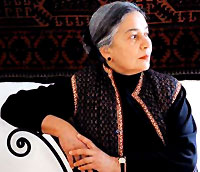Baugmarten`s Bombay is a novel written by the prominent writer Anita Desai, this is a tale of the Jewish boy who comes to India and see the surroundings and different places of India. So the title of the story depicts that Bombay is seen through Baugmarten`s eye thus aptly describes the name.
Anita Desai is Indian novelist and short story writer. Anita Desai is specially noted for her insightful depiction of the inner life of the female characters in her writings. She always tried to point out the diversified characters of women in her writing. In many of her works Anita Desai has highlighted the tensions among the family members and disaffection of middle-class women. Her flowering writing career as a novelist started with `cry, the peacock` in the year 1963. It was followed by Voices of the City;  Fire on the Mountain and many more to enlighten her path as a writer. Anita Desai`s works were short listed for the Booker prize three times. Anita Desai is a Fellow of the Royal Society of Literature in London. She has also been a member of the Advisory Board for English at the National Academy of Letters in Delhi and a Member of the American Academy of Arts and Letters as well. She has been a Visiting Fellow at Girton College, Cambridge, England and has taught writing at Smith College. Anita Desai has been the Purington Professor of English at Mount Holyoke College in the United States. She is very prominent in her field and has every capability to excel in her field as well.
Fire on the Mountain and many more to enlighten her path as a writer. Anita Desai`s works were short listed for the Booker prize three times. Anita Desai is a Fellow of the Royal Society of Literature in London. She has also been a member of the Advisory Board for English at the National Academy of Letters in Delhi and a Member of the American Academy of Arts and Letters as well. She has been a Visiting Fellow at Girton College, Cambridge, England and has taught writing at Smith College. Anita Desai has been the Purington Professor of English at Mount Holyoke College in the United States. She is very prominent in her field and has every capability to excel in her field as well.
Synopsis:
Mrs. Desai`s novel Baugmarten`s Bombay opens with a lady called Lotte fleeing the scene of a murder. She`s just lost a close friend, Hugo Baumgartner. When she gets back home, all that is left of Baumgartner`s life are a few postcards sent by his mother during the Second World War. Consequently the story proceeds towards the life of Hugo Baumgartner. The story starts with his childhood in Berlin. At the age of about eight, his father, a Jewish furniture retailer loses his business, the Nazis ransack his store and he is taken to a concentration camp. Baumgartner and his mother are forced to leave their beautifully furnished apartment and hide in the former office of the shop. At school also Baumgartner`s situation becomes unbearable. His relation with friends become worst. Eventually, his survival in Germany becoming a matter of days, his mother agrees to Herr Pfuehl`s idea to send his son to India, since he has a few connections there in the furniture production business. He makes a living in India until his Indian supporter dies. After that at an early age he plunges into poverty. He never gets over the death of his mother, who refused to emigrate. He is totally a passive personality whose one joy is caring for stray cats in his small apartment. Not only is he a dull protagonist, but also Desai withholds the few interesting parts of his life until toward the end. The author may be investigating bigger themes by looking at the world and Indian society through the eyes of such a character. Baumgartner arouses some feelings of empathy in the whole story. The sights, sounds and smells of Calcutta and Bombay become prominent along with Hugo. These are the positive points of this story. And moving too, the life of this pathetic and insignificant man Baumgartner who does belong neither to Hitler`s Germany nor to India`s society. In India he is an eternal `firanghi`, foreigner or a wounded survivor.
Baugmarten`s Bombay by Anita Desai is published by Mariner Books in the year of 2000.
This novel is the achievement of a superior writer with a sharp perception about human nature, loss, or solitude. This is a story by Anita Desai where she discussed many aspects of life including life`s meaning both socially and culturally.













